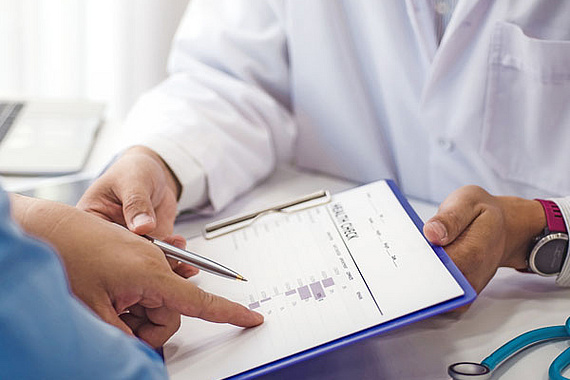- The University
- Studying
-
Research
- Profile
- Infrastructure
- Cooperations
- Services
-
Career
- Med Uni Graz as an Employer
- Educational Opportunities
- Work Environment
- Job openings
-
Diagnostics
- Patients
- Referring physicians
-
Health Topics
- Health Infrastructure
TREATMENT OPTIONS
The special outpatient clinic for bipolar affective disorders is run by an interdisciplinary team of specialists and residents in psychiatry and psychotherapeutic medicine, clinical psychologists, students, research assistants and a biomedical analyst.
As a clinical care and research special ambulance, we offer a broad range of treatment options.

Range of treatment options

SPECIALIST TREATMENT
An initial appointment lasting about one hour involves expanded diagnosis and treatment including a description of your current symptoms, your prior medical history and previous drug and/or psychological and psychotherapy treatments. Please bring any previous medical findings if they are available. We are committed to creating a treatment plan with you that complements specialist and psychotherapeutic/psychological care in a private practice. If you have received a tentative diagnosis of bipolar disorder or you have special concerns (e.g., pregnancy and bipolar disorder), you have come to the right place. You will arrange individually with your doctor whether additional appointments are necessary. It may make sense to modify the previous drug therapy. In this case, more frequent controls may be necessary at first.

PSYCHOEDUCATION
An important element in the treatment of bipolar disorder is that those who are affected become experts in their own disease and develop effective strategies for handling the disease. Psychoeducation aims to impart knowledge of the symptoms and biological basis of the disease as well as possible drug and nondrug treatment strategies in order to identify triggers and recognize early warning signs. In addition, you can get to know your own early warning signs of an episode in a group setting and develop strategies for handling them in the future.
The psychoeducation group currently meets online. More information about dates and content is available here.

DETAILED DIAGNOSTIC TESTING IN RESEARCH PROJECTS
You can actively contribute to research on bipolar disease by participating in scientific projects. These studies involve a variety of tests, and feedback on all results is available at your request. For those who participate in our long-term study, a comprehensive blood panel, an examination of cognitive abilities and magnetic resonance imaging (MRI) of the brain will be conducted every six months.

CONTACT WITH SELF-HELP GROUPS
Self-help groups have a special significance for people with bipolar disorder. They allow them to share their experiences with the mental illness, current problems or positive events.
This group is self-organized (no medical/psychological supervision) and currently meets every first Thursday of the month at 17:30 in the seminar room of the Division of Psychiatry and Psychotherapeutic Medicine at University Hospital Graz.
For reasons of data protection, please send an email to bipolar-spezialambulanz(at)medunigraz.at if you are interested and give your consent to the forwarding of your data to the self-help group.

EVENING LECTURES
Regular evening lectures are held for patients and their family members (start: after 17:00). Special clinical staff or external experts speak on topics related to bipolar disorder. Following the lecture, it is possible to share your experiences in an informal atmosphere and participate in the self-help group. A group for family members is also organized as needed.
Lecture events
Our previous lectures
- 29.09.2022: "Psychische Erkrankungen im Wandel der Zeit"; Robert Queissner
- 02.06.2022: – „Heraus aus der Krise“; Eva Reininghaus & Nina Dalkner
- 06.02.2020: - „Stressregulation in der Behandlung der bipolaren Erkrankung“; Melanie Lenger
- 08.11.2018 – „Ernährung und Psyche – Nutrional Psychiatry“; Sabrina Mörkl, Jolana Wagner-Skacel
- 08.03.2018 – „Frühwarnzeichen und Symptommonitoring“, Frederike Fellendorf
- 06.07.2017 – „Ich und die Anderen – Emotionen in Beziehungen“, Jolana Wagner-Skacel
- 12.01.2017 – „Diagnose Bipolar – Was nun?“, Eva Reininghaus
- 05.07.2016 – „Darm-Gehirn-Achse“, Eva Reininghaus
- 12.05.2016 – „Psychiatrische Rehabilitation“, Bernd Reininghaus
- 03.03.2015 – „Körperwahrnehmung bei bipolarer Erkrankung“, Ursula Danner
- 07.10.2014 – „Bipolare Erkrankung – Verstehen und Akzeptieren lernen“, Hans-Peter Kapfhammer


